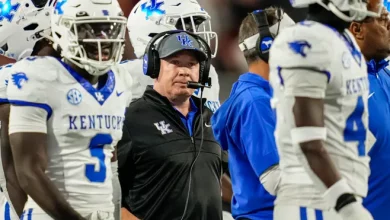From Vince Young to Arch Manning, Texas quarterback star power fuels their resurgence, shaping their identity and aspirations as they aim to reclaim national dominance.

Texas football has long been a symbol of pride, tradition, and competitive excellence in college sports. The state’s rich high school football culture, combined with a storied history at the University of Texas, has cultivated a reputation for producing elite talent—especially quarterbacks. Over the years, the quarterback position has served as both a reflection of the program’s aspirations and a catalyst for its resurgence.
From the legendary Vince Young, whose heroics in the mid-2000s elevated Texas to national prominence, to the highly touted Arch Manning, the nephew of Eli and Peyton Manning, Texas’s quarterback lineage embodies its ambitions for greatness. These quarterbacks have not only electrified fans but also defined the identity of Texas football, fueling a renewed sense of purpose as the Longhorns seek to reclaim their place atop college football’s elite.
This essay explores the significance of quarterback star power in Texas’s football renaissance, examining how the legacies of Vince Young and Arch Manning exemplify the program’s pursuit of excellence, and how their presence shapes Texas’s future aspirations.
The Legacy of Vince Young: The Catalyst of the Modern Era
Vince Young’s Impact on Texas Football
Vince Young arrived at Texas in the early 2000s amid high expectations. A native of Houston, Young was a dynamic and dual-threat quarterback whose athleticism and leadership transformed the Longhorns’ offensive identity. His 2005 season culminated in the historic BCS National Championship victory over USC—a defining moment that revitalized Texas football and reestablished its national prominence.
Young’s electrifying play style, marked by clutch performances and game-winning drives, made him a legend. His 2006 NFL Draft selection and subsequent success in the league further cemented his status as one of Texas’s most iconic quarterbacks. Yet, beyond individual accolades, Young’s impact was cultural: he symbolized a new era of Texas football—one characterized by explosive offense, resilience, and a relentless pursuit of greatness.
Reinforcing Texas’s Identity
Young’s success helped redefine Texas’s football identity, emphasizing a versatile, high-powered offense that could adapt to modern college football trends. His leadership on and off the field inspired future generations, and his legacy became intertwined with Texas’s quest for national relevance.
The Long-term Effect
The Vince Young era demonstrated that Texas could produce quarterbacks capable of competing on the highest stage. His heroics energized recruiting efforts and set a standard for excellence, inspiring coaches and players alike. His legacy also underscored the importance of the quarterback position as a symbol of the program’s ambitions.
The Rise of a New Generation: The Modern Resurgence and the Search for Star Power
Post-Vince Young Challenges
After Young’s departure, Texas faced challenges in maintaining its quarterback tradition. The program experienced coaching changes, inconsistent recruiting, and a struggle to develop a stable quarterback pipeline. While talented players emerged, Texas often fell short of national championship expectations, in part due to quarterback play that didn’t reach the same legendary heights.
The Importance of Star Power
In college football, star quarterbacks are more than just players; they are symbols of a program’s identity and aspirations. They energize fan bases, attract recruits, and elevate the team’s profile nationally. Recognizing this, Texas has prioritized securing high-profile quarterbacks to restore its national stature.
The Impact of Recent Quarterbacks
Recent years saw Texas land talented quarterbacks such as Sam Ehlinger, who led the team to multiple bowl victories and provided leadership during transitional periods. However, the program still sought that transcendent star to elevate its national perception—someone capable of energizing the fan base and competing for championships.
Enter Arch Manning: The Next Great Texas Quarterback
The Manning Legacy
Arch Manning, the grandson of Archie Manning and nephew of Eli and Peyton Manning, enters the scene with enormous expectations. As a highly-touted recruit from New Orleans, Manning’s name alone carries weight. His recruitment was a national spectacle, symbolizing Texas’s ongoing quest to land elite quarterbacks.
Why Arch Manning Matters
Manning’s arrival at Texas represents more than just a talented quarterback joining the roster; it signifies the program’s intent to restore its quarterback legacy. His pedigree, combined with his skill set—impeccable pocket presence, strong arm, and football IQ—makes him a potential game-changer.
A Symbol of the Program’s Aspirations
Manning’s commitment to Texas is a statement of intent. It signifies the program’s recognition that star power at the quarterback position is essential to regaining national dominance. His presence energizes the fan base, attracts recruiting attention, and sets a tone for the team’s future.
The Cultural Significance of Quarterback Star Power in Texas
Rebuilding the Identity
Texas football’s identity has long been tied to dynamic, charismatic quarterbacks who can lead on the biggest stages. Vince Young’s heroics and Manning’s pedigree embody this tradition. Their star power defines Texas’s football narrative—one of excellence, resilience, and national relevance.
Inspiring Future Generations
These quarterbacks serve as role models for young athletes across Texas and beyond. Their success stories motivate high school prospects and reinforce Texas’s reputation as a quarterback factory.
Driving Recruiting and Media Attention
Having a marquee quarterback like Arch Manning attracts top recruits, media coverage, and national accolades. It creates a ripple effect—raising the program’s profile and fostering a winning culture.
The Road to National Prominence: How Quarterback Power Shapes Texas’s Future
Building a Winning Culture
The presence of star quarterbacks influences team culture, instilling confidence and a winning mentality. Texas’s strategic focus on recruiting elite quarterbacks aims to assemble a roster capable of competing at the highest level consistently.
Aligning with Modern College Football
The evolution of college football emphasizes dual-threat quarterbacks and offensive innovation. Texas’s pursuit of quarterbacks like Vince Young and Arch Manning aligns with this trend, ensuring the program remains competitive.
Long-Term Impact
A star quarterback can be the difference-maker in high-stakes games, conference championships, and national title pursuits. Texas’s investment in quarterback talent is both a reflection of tradition and a strategic move toward sustained success.
Challenges and Opportunities
Expectations and Pressure
While star quarterbacks bring excitement, they also carry immense pressure. Managing expectations and developing these talents is crucial for long-term success.
Developing Depth and Pipeline
Texas must continue to develop a pipeline of talented quarterbacks to sustain its competitive edge. The legacy of Vince Young and Arch Manning underscores the importance of recruiting, coaching, and player development.
Balancing Tradition and Innovation
Texas’s history of legendary quarterbacks provides a foundation, but adapting to modern football strategies remains essential. Combining star power with innovative play-calling will be key to the program’s resurgence.
The lineage of Texas quarterbacks—from Vince Young’s electrifying national championship run to Arch Manning’s heralded arrival—embodies the program’s enduring pursuit of greatness. These stars are more than individual athletes; they are symbols of Texas football’s identity, resilience, and aspirations.
Star power at the quarterback position has historically defined Texas’s football narrative, energizing fans, inspiring recruits, and shaping the team’s competitive landscape. As the Longhorns aim to reclaim their rightful place among college football’s elite, the focus on elite quarterback talent remains central.
Arch Manning’s arrival signifies a new chapter—one rooted in tradition but driven by modern ambition. His presence not only revitalizes the program’s quarterback legacy but also serves as a beacon of hope for Texas’s future success. The Longhorns’ journey back to national prominence will undoubtedly be influenced by the star power of their quarterbacks, reaffirming that in Texas football, the quarterback is more than a position—it’s a symbol of excellence, hope, and the relentless pursuit of greatness.









